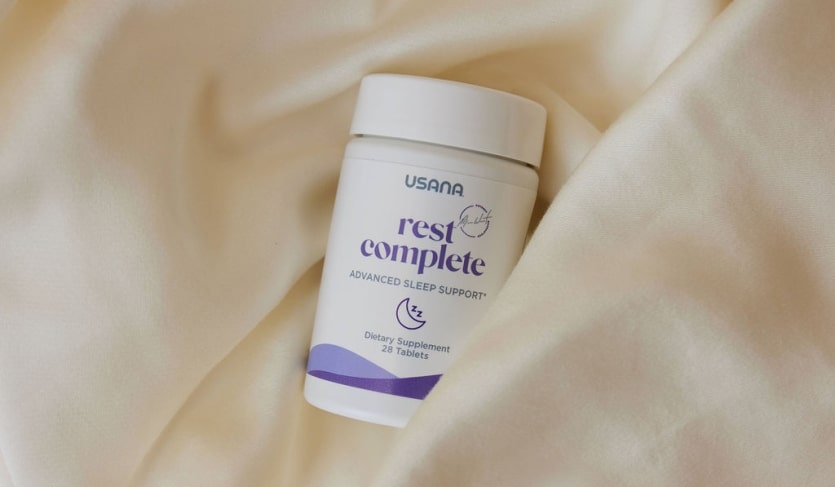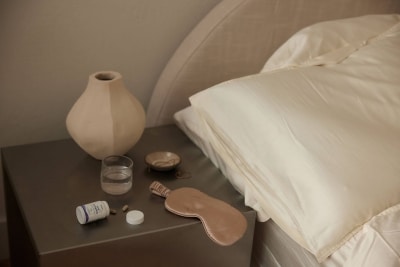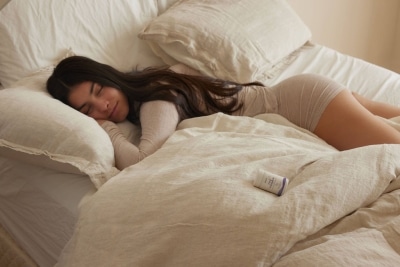USANA Rest Complete
Do you ever feel restless when it’s time for sleep? Like your mind or body just isn’t tired yet? If so, you are not alone. Sometimes your nervous system needs some help getting the message. That it’s late, you have a busy day tomorrow, and it’s time for bed.
USANA Rest Complete is a comprehensive sleep supplement that helps your body and mind prepare for bedtime. Take Rest Complete one hour before bedtime to relax your muscles, reduce anxiety, and promote restful sleep.*
Rest Complete contains:
- Melatonin to help promote drowsiness and restful sleep*
- Ashwagandha to calm your mind and reduce anxiety*
- GABA (Gamma-Aminobutyric Acid) and L-theanine to calm your nerves and relax your muscles*
Sleep is essential for recharging your body and mind. It helps ensure that you feel fresh and alert as you live your life. Sleep supports brain functions like concentration, clear thinking, and memory processing. It also helps regulate emotions, supports your ability to manage stress, consolidates memories for learning, and improves decision making and problem-solving abilities.
Sleep is important for your physical health too. Good sleep helps aid in the healing and repair of all muscles, tissues, and your individual cells. Additionally, sleep supports the immune system to fight off infections. Sleep also affects hormones that control appetite, which can influence body weight. In essence, sleep is as vital to our survival as food and water. It impacts nearly every type of tissue and system in your body.
Unfortunately, when sleep doesn’t come easily, its benefits remain just out of reach. There are many different reasons that you might have trouble getting to sleep or staying asleep through the night.
Outside factors like staying up late watching tv or looking at your phone can disrupt your sleep for hours after the lights go out. Internal thoughts and worries about family, work, finances, or even worrying about sleep itself can also make it hard to quiet your mind and find rest.
Melatonin Helps Support Your Natural Sleep Cycle
Melatonin is a hormone that plays a crucial role in initiating sleep. It is synthesized in the brain’s pineal gland. Its primary function is to regulate the body’s sleep-wake cycles. In essence, it helps keep your body in sync with the 24-hour cycle of the sun.
Melatonin production is halted during daylight hours. Then, as daylight fades and evening approaches, melatonin production increases. Throughout the night, elevated melatonin levels cue your body that it’s time to rest.
Modern life frequently exposes us to artificial lighting at night. It comes from the TV, phone screens, or the lights throughout your home. This light inhibits melatonin production and can disrupt your natural circadian rhythm—the body’s internal clock. When that happens, it can be difficult to wind down for sleep and get a good night’s rest.
Consider Rest Complete to ensure consistent melatonin levels throughout the night. Rest Complete is designed to align your body with the Earth’s natural cycle of light and darkness, fostering a more organic sleep rhythm. Taking Rest Complete roughly an hour before sleep can lead to reduced alertness, increased drowsiness, and ultimately sleep.*
Melatonin supplementation has other uses too. For those concerned that sleep deprivation might disrupt a holiday or cause tiredness during a business trip, melatonin is an ideal travel partner. It’s known to alleviate jet lag, particularly when traveling across multiple time zones. Melatonin can help realign your body and mind with the 24-hour light and dark cycle found in your travel destination.
Beyond aiding sleep, melatonin also contributes to cellular health. It functions as an antioxidant, scavenging free radicals, and bolstering the body’s endogenous antioxidant enzymes. By combating oxidative stress that damages cells, melatonin not only supports sleep but also enhances the body’s restorative activities during slumber.
Rest Complete Helps You Feel Calm and Eases Your Mind
Lights might not be the only thing keeping you up at night. When life becomes busy and hectic, it can be difficult to turn your mind off when it comes time to go to sleep. Rest Complete takes a holistic approach to helping you sleep, and helps you address a variety of different aspects that might be keeping you up at night.*
Rest Complete contains Ashwagandha, which is known to have a myriad of health benefits. This potent herb is included in Rest Complete because it helps regulate cortisol and neurotransmitter levels, contributing to a balanced stress response.*
Ashwagandha works by modulating the body’s stress mechanisms in a way that mimics the effects of mild stress without causing any adverse effects. This process effectively boosts your body’s adaptability, enabling you to stay calm amidst various kinds of stress—physical, mental, or environmental.
Ashwagandha has other benefits such as antioxidant properties, and physiological and psychological benefits. It is known to promote a sense of tranquility and aids in sustaining cognitive functions. This combination of benefits helps put your mind at ease, which is conducive to restful sleep.
Rest Complete Helps Calm Your Nerves and Muscles
Rest Complete contains GABA (Gamma-Aminobutyric Acid)—a neurotransmitter that helps to calm the body and mind by turning off wakefulness and quieting nerve activity. It also contains L-theanine, an amino acid that signals to your body that it needs to make more GABA too. This helps maintain elevated GABA levels in your body throughout the night.*
GABA is an amino acid neurotransmitter. It helps facilitate communication between neurons. Notably, GABA functions as an inhibitory neurotransmitter, halting some message transmissions and slowing the rate of other neural communications.
The collection of neurons that utilize GABA, known as the GABAergic system, act as a regulatory mechanism akin to a brake pedal. It helps slow down the transmission of information, lessen the actions of other neurotransmitters, and lower the excitation of brain neurons.
The experience of stress, anxiety, or fear is often linked to excessive neuronal activity and stimulation. GABA’s reputation for fostering relaxation and a sense of calm is tied to its ability to counteract such overactivity.
In the realm of sleep regulation, GABA plays a pivotal role. When it’s time to rest, the GABAergic system intensifies its function, soothing the nervous system and inducing tranquility. This process aids in the shift from wakefulness to the initial sleep stage and beyond. Hormones such as melatonin target GABA receptors to further enhance the calming action of the GABAergic system.
Usage
Adults take one (1) tablet as needed one hour before bedtime for relief of occasional sleeplessness.
Ideal For
- Adults struggling with occasional sleeplessness
- Night shift workers
- Jet Lag
References
https://www.nigms.nih.gov/education/pages/Factsheet_CircadianRhythms.aspx
Han KS, Kim L, Shim I. 2012. Stress and sleep disorder. Exp Neurobiol 21(4): 141-150.
Czeisler CA. 2013. Perspective: casting light on sleep deficiency. Nature 497(7450): S13.
Xie Z, et al. 2017. A review of sleep disorders and melatonin. Neurol Res 39(6): 559-565.
https://www.ncbi.nlm.nih.gov/books/NBK19961/
Copinshi G. 2005. Metabolic and endocrine effects of sleep deprivation.
Ess Psycopharm 6(6): 341-7. {also MEMORY}
Watson, AM. 2017. Sleep and athletic performance. Curr Sports Med Rep 16(6): 413-418.
National Sleep Foundation. What Happens When You Sleep?
Mayo Clinic. Is melatonin a helpful sleep aid – and what should I know about melatonin side effects?
*These statements have not been evaluated by the Food & Drug Administration. This product is not intended to diagnose, treat, cure, or prevent any disease.







